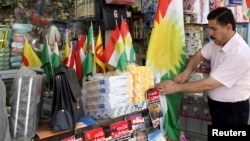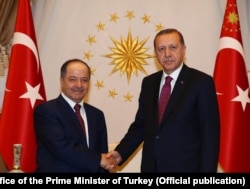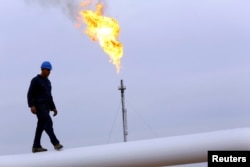A bid by Iraqi Kurds to achieve independence could threaten a partnership with neighboring Turkey.
"The [referendum] decision by the northern Iraqi authority deeply saddened us," Turkish President Recep Tayyip Erdogan told his ruling AKP lawmakers this past Tuesday.
"A step toward the independence of northern Iraq is a threat to the territorial integrity of Iraq, and it is wrong," he added.
Erdogan has built a close, if not unlikely, relationship with Masoud Barzani, president of Iraq's semi-autonomous Kurdistan Regional government, or KRG. In past years, Erdogan dismissed Barzani as nothing more than a bandit, but the two men have developed an increasingly powerful alliance based on shared economic and regional interests.
Erdogan's criticism of Barzani is not necessarily what it seems.
"Compared with his [Erdogan's] usual style, his reaction to Iraqi Kurdistan declaration to hold a referendum for independence cannot be qualified as harsh," said former Turkish diplomat Aydin Selcen, who founded Turkey's consul in the Iraqi Kurdish capital of Irbil. "And the frequency of the comments suggests this is not one of the main concerns of Ankara at this moment. Rhetoric is something and action is something else."
Ankara has the means to quickly bring the KRG under its influence, as it depends on Turkey to pipe its oil to international markets through the Turkish Mediterranean port of Ceyhan.
"The significance of oil and potentially gas exports in terms of budget revenues and the dependence of the KRG on Turkey for export of its oil, Turkey does have leverage on the KRG," said Sinan Ulgen, a visiting scholar at Carnegie Europe in Brussels.
Ankara has so far not hinted at threatening to turn off the spigot.
"It will depend on what the next steps will be. Just holding the referendum, which is not binding, will in itself not change the nature of this relationship," said Ulgen. "But if the KRG decides to take more formal steps to achieve this aim, then certainly this will have a much more durable effect on this relationship."
Ankara has also expressed concerns on the scope of the planned referendum scheduled for September 25. The inclusion of the oil-rich city of Kirkuk in the vote has provoked alarm.
"What really concerned us was that Kurdish leaders want to include Kirkuk in this process while, according to the Iraqi constitution, Kirkuk is an Iraqi city and is not within Kurdish boundaries," Ibrahim Kalin, spokesperson for the Turkish presidency, said at a press conference Wednesday. "If any attempts will be made to forcefully include Kirkuk in the referendum question, problems will be made for Kirkuk and its surrounding areas."
Kirkuk is claimed by the Iraqi Kurds as their capital, but Turkmen also have claims over the city. Ankara's concerns over Kirkuk may be more about domestic considerations.
"This is for internal political reasons Mr. Erdogan is continuing to stick to the consolidating of nationalist support inside Turkey," said former Turkish diplomat Selcen. "So this is the reason we are going through the motions in this case."
Kirkuk, and the fate of regional ethnic Turks, are symbolically important for Turkish nationalists. Ankara, however, appears to be turning more than a blind eye to Iraqi Kurds' ongoing control of the city after its forces captured it from Islamic State.
"The oil continues to flow not only from Iraqi Kurdistan previously produced oil fields, but also from recently acquired Kirkuk oil fields which flow through the Turkish pipeline market through to Ceyhan," said Selcen.
Oil exports from the Iraqi Kurdish region, through Turkey, have become part of an extremely lucrative partnership.
"It's a relationship that has blossomed since 2008, that has now taken the form that the KRG has almost become Turkey's economic hinterland and a number of potentially important oil and gas deals are in the pipeline," noted analyst Ulgen. "And Barzani is the person who has delivered this."
Barzani's public support of Erdogan is also seen as important for the Turkish president in his bid to maintain legitimacy among Turkey's Kurdish minority, with an ongoing crackdown on the Kurdish rights movement.
Barzani, however, has been facing growing internal pressure as the referendum call is seen as an attempt to help consolidate his position.
"KDP [Barzani's party] needed this referendum call to strengthen its position to be able to keep its base," said Selcen, adding that Ankara's restrained reaction to the planned vote underlines the importance it attaches to its key ally. "The relation with the KDP is one of the most important assets for Ankara in the region."










